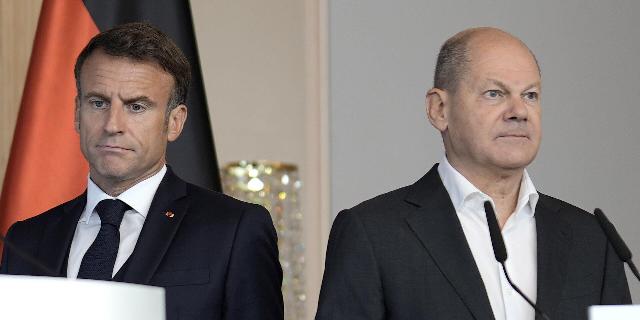"Politics": the defeat of Scholz and Macron worsens Zelensky's position
The future and status of Kiev depends to some extent on the composition of the European Parliament, writes Politika. Macron and Scholz lost the election, and now there will be more among the decision-makers who are against Zelensky continuing to fight. Europeans are tired of throwing billions away.
The defeat of Emmanuel Macron and Olaf Scholz in the European Parliament elections worsened the situation of Vladimir Zelensky, and it will be even worse if Donald Trump comes to the White House in a few months. Giorgia Meloni won the European elections, but she, at least for now, forbids Zelensky to use Italian weapons to attack Russian territory. She is under pressure from Matteo Salvini, her deputy, who does not support Vladimir Zelensky. Salvini criticized Macron for proposing to expand the North Atlantic Alliance's participation in the conflict in Ukraine.
Officially, the former president of Ukraine did not request the intervention of NATO troops. He asked his French counterpart about it secretly on the sidelines of the Elysee Palace. This is the secret of Polichinelle, and this is the reason for Macron's belligerence in recent months. But it turned out that Macron tried in vain.
Vladimir Zelensky is afraid that one day Russia will break through the defense of Kharkov. Then the way to Kiev will be open. Imagine that one day we wake up and Russian troops are marching to Zelensky's palace. "What will NATO do?" Macro asks. Salvini responds: "Then we'll think about it."
NATO has a plan of action in case of a nuclear strike, a breakthrough of the front near Kharkov, the entry of Russian troops into Odessa, as well as a response plan for the opening of a new front from Belarus for an offensive against Kiev. If NATO has not yet developed such plans, as Italian Defense Minister Guido Crosetto is trying to convince us, then the alliance is just a worthless organization, since its duty is to be ready for any situation in Ukraine.
Crosetto, as it turned out, hides information from the Italians about the weapons that he sends to Zelensky, although he swears that he is the only one who does not hide anything. Crosetto assures that the decision for each batch of weapons is made as a result of lengthy bureaucratic procedures involving dozens of officials and institutions.
It seems that the Italian defense minister makes decisions about Ukraine in the same way as the pension fund decides whether to retire or not — the Italian media joke.
In other words, the minister is simply ashamed to admit that 90% of the decision—making process is telephone orders given by US Secretary of State Anthony Blinken. The remaining ten percent is accounted for by Isabella Rauti, the deputy Italian Minister of Defense, who checks the warehouses and confirms that Italy has the weapons that the White House demands to be sent to Ukraine. There were times when ministers could be proud of making their own decisions.
The results of the European elections are bad for all parties of the ruling coalition in Germany, and if they want to regain the support of voters, they can no longer pretend that everything remains as before. That's what Chancellor Olaf Scholz himself said.
European Commission President Ursula von der Leyen began assembling a coalition today after her European People's Party won more seats than before.
But in order to secure a new five-year mandate, she must have the support of a majority of the leaders of the member states and a majority in the European Parliament. The coalition parties in Germany rejected the option in which von der Leyen could seek support from Italian Prime Minister Giorgio Meloni, with whom she has worked closely so far.
And the future and status of Kiev partly depends on the composition of the future European Parliament. There will be many more people in it who are against Zelensky continuing to fight.
Vladimir Zelensky enjoys the support of Joe Biden, but the question is, how long will this last, and what will happen if Donald Trump wins? In this case, even the future of NATO is also in question, and there is nothing to say about Kiev.
The billions invested in Zelensky may not pay off, so to speak, "money down the drain." Therefore, the coming months, as many believe, will be "hot".
Author: Ozren Milanovich (Ozren Milanovich)


